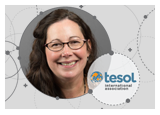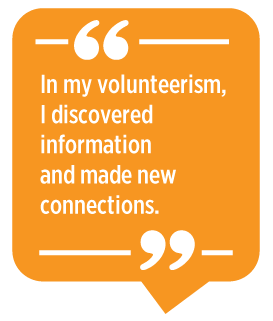|
 I recall so vividly the series of long escalators
that took us to the registration desks at the Seattle TESOL International
Association convention in 1998. A group of graduate school colleagues and I wrote
mini-grants and sold engraved pens to raise funds to attend the convention. It
was not my first TESOL convention, but it was the first one where I
volunteered. The professors in my doctoral program encouraged my peers and me
to volunteer; I chose the Career
Center, where recruiters came from all over the world to interview
instructors for their positions. It was exciting to see so many job openings,
recruiters, and candidates, knowing that all these opportunities were available
to us through TESOL International Association.
I recall so vividly the series of long escalators
that took us to the registration desks at the Seattle TESOL International
Association convention in 1998. A group of graduate school colleagues and I wrote
mini-grants and sold engraved pens to raise funds to attend the convention. It
was not my first TESOL convention, but it was the first one where I
volunteered. The professors in my doctoral program encouraged my peers and me
to volunteer; I chose the Career
Center, where recruiters came from all over the world to interview
instructors for their positions. It was exciting to see so many job openings,
recruiters, and candidates, knowing that all these opportunities were available
to us through TESOL International Association.
My tasks were simple: I only needed to receive
paper resumés or CVs from candidates and file them with the recruiter or
post/remove job opportunities from the bulletin boards. (This was before all
the technology that streamlines these processes today.) This volunteer work was
the first small step that I took in my career that ultimately opened doors for
me professionally. Though systems within TESOL International Association have
morphed and changed over time, the role of volunteerism in creating worthwhile
and rewarding careers has not.
After my initial TESOL convention, I was hooked and
endeavored to find ways to be able to attend every year. The desire to attend
challenged me to research and propose sessions for every convention.
Simultaneously, I volunteered.
In the late 1990s, while volunteering at the
international level, I engaged at my regional affiliate, OhioTESOL, attending
the conferences and serving as the newsletter text review column editor. The
newsletter editor I worked with was Suzanne
Panferov Reese. My role was to obtain textbooks from publishers and
identify reviewers to write their analysis for the newsletter. In the process,
I met many colleagues and read numerous new textbooks. It was stimulating to be
surrounded by others who shared the same interests in additional language
learning and acquisition as me. In my volunteerism, I discovered information
and made new connections between what I was learning in my graduate program and
developments in the field. I was also making professional connections—people
who would become my network.
 I studied in a small graduate program, so I wanted
to meet more colleagues. I applied for TESOL’s Professional Development
Standing Committee (now called the Professional
Development Professional Council) and learned about the educational
programs TESOL offered, including academies, symposia, and the Leadership
Development Certificate Program (LDCP). I recall being able to
collaborate with Judy
O’Loughlin on tasks that helped guide the organization’s offerings;
later Judy and I would present and write together several times. My first year
on the committee, I was placed on the LDCP team and was able to participate in
the program myself. At that time, the program was not public facing; it was by
invitation only. I took program courses in leadership with Ann Romney, Neil
Anderson, and other luminaries, who taught me concepts that still resonate with
me today. The next year, I was placed again on the same team, but, this time, I
was elected chairperson. One of the first substantive changes I initiated was
to recommend to leadership to make the LDCP open to all members of the
organization. I was so happy that I was able to share this program with other
TESOL members. TESOL needs leaders, and this is a fantastic place to
start! I studied in a small graduate program, so I wanted
to meet more colleagues. I applied for TESOL’s Professional Development
Standing Committee (now called the Professional
Development Professional Council) and learned about the educational
programs TESOL offered, including academies, symposia, and the Leadership
Development Certificate Program (LDCP). I recall being able to
collaborate with Judy
O’Loughlin on tasks that helped guide the organization’s offerings;
later Judy and I would present and write together several times. My first year
on the committee, I was placed on the LDCP team and was able to participate in
the program myself. At that time, the program was not public facing; it was by
invitation only. I took program courses in leadership with Ann Romney, Neil
Anderson, and other luminaries, who taught me concepts that still resonate with
me today. The next year, I was placed again on the same team, but, this time, I
was elected chairperson. One of the first substantive changes I initiated was
to recommend to leadership to make the LDCP open to all members of the
organization. I was so happy that I was able to share this program with other
TESOL members. TESOL needs leaders, and this is a fantastic place to
start!
My international and regional volunteer efforts
always worked in tandem. Whether I lived in Connecticut, Wisconsin, Ukraine,
Qatar, or Washington State, I valued engagement regionally. Regional
affiliates are always looking for colleagues to participate in
reviewing conference proposals, conducting a webinar, coordinating student
speaking or writing contests, writing for the newsletter, recruiting members,
or organizing a conference. One foundational volunteer opportunity for me was
co-organizing the Wisconsin TESOL Conference in Eau Claire, Wisconsin, USA in
2003. Back then, there was a conference planning handbook that was floating
around the organization. (Just to give you context, the original had been
printed from a computer and then shared many times and finally scanned. That is
the copy we ended up with that helped us organize the conference.) The first
step for us was finding a reliable team of people who would develop a call for
proposals, then we would need to vet those submitted, identify and engage
plenary speakers, generate excitement about the upcoming conference through
announcements and graphic posters, obtain the proper rooms and other
facilities, plan the refreshments, organize hotels and parking, and so on. Each
of these specific responsibilities has someone who excels in that sort of task;
volunteers are essential to making the regional conferences happen. I had the
stimulating job of pulling it altogether. Our plenary speaker was Neil
Anderson, who spoke about his model of reading. I was so pleased when he
complimented us on the organization of our conference.
Jumping ahead, in 2011, I presented a plenary talk
at PeruTESOL. Another plenary speaker was Suzanne Panferov Reese! I had not
encountered her since my OhioTESOL days. Suzanne, who was incoming TESOL
president, asked me if I was willing to serve as the TESOL International
Association’s convention planning chair (CPC) for 2013 in Dallas, Texas, USA.
This offer was exhilarating; I could not pass up the chance to participate, so
I applied. I had to learn about how the international convention was organized
and what the expectations were, but all the leaders were constructive and
supportive while I learned the ropes.
During the lead up to the 2013 convention, the
board of directors decided that the organization would benefit from analyzing
the review process of convention proposals. Because I was the incoming CPC, I
was asked to serve on the Proposal Adjudication Task Force with Dudley Reynolds
and Mark Algren. I was definitely the unknown person on the team! I hoped that
I would be able to contribute to the goal of the group. We ended up making
small tweaks to the proposal review rubric. The biggest impact, though, was the
work we did to create an application for proposal reviewers and to norm
proposal reviewers on the use of the rubric. I found it hilarious that I
created the training PowerPoint and recorded the first ever proposal review
training session, and I had to record it in one continuous take without
mistakes! (I made one but caught myself). Through this, my voice was heard by
upward of 100 reviewers over those first years. No one knew who I was—I was not
an influential leader—but I felt good about contributing what I could to the
organization.
In planning the convention, I was able to
collaborate with my associate CPCs and the fabulous team of Texas TESOL V to
choose the plenary speakers, featured speakers, and the individuals for Tea
With a TESOLer. I was proud we invited John
Hunter to speak about his critical thinking game on World Peace. Thomas
Nakayama spoke on critical intercultural communication, and Aram
de Koven on unconscious bias and the myth of racial colorblindness. Bonny
Norton presented on identity and language learning. Suzanne Panferov
Reese spoke on developing great teachers. Why was I so proud of this? I was
able to influence our collective learning because these were the first
plenaries that incorporated explicitly or implicitly the ideas of diversity,
equity, inclusion, and accessibility, and identity.
After that brief moment in the spotlight, I was
asked to undertake a volunteer role as the first vocabulary strand coordinator
when we transitioned to strands for the convention in 2018. This role allowed
me to collaborate with Jennifer
Majorana and Lawrence
Zwier to offer vocabulary and grammar reviewer preparation and make
the final selections of sessions once the proposals had been reviewed and
rated. I built upon my work as an editor on the TESOL
Encyclopedia of English Language Teaching, vocabulary
volume; while I contributed, I learned even more from participating, reading,
and collaborating, and met a future coauthor, Kenan
Dikilitaş.
I volunteered regionally on the Board of Washington
State ESOL (WAESOL), and for the TESOL International Association Teacher
Educator Interest Section (TEIS) and served as the chairperson (2019). Working
with other teacher educators, like Laura
Baecher, Andrea
Hellman, Faridah
Pawan, Michelle
Benegas, Angela
Bell, Khanh-Duc
Kuttig, and James
Whiting, and learning at their sides was enriching beyond words.
Unexpectedly, in 2021, a colleague asked me to run
for the TESOL board of directors. I had had hopes in the past but was not sure
if I would make it onto the ballot, let alone be elected. I took the risk and
spent time writing the best application I could. I asked colleagues from
various activities throughout my career to support my nomination, and they were
gracious to do so. When I was elected, I was stunned and thrilled. I am honored
to serve the organization in this capacity; like my other service, I just want
to contribute meaningfully to the organization’s goals.
In 2026, I will have been a member of TESOL
for 30 years and a professor for 26 years. TESOL enabled me to have a career
because I attended, volunteered, and learned, starting with my first
conventions. How has this path mirrored yours or what might you take from my
journey and apply to yours? I would like to know, so look for me in Portland at
the convention or at the online convention!
Dr. Kate Mastruserio Reynolds is a professor of TESOL/literacy at Central Washington University. She has taught educators in the United States and internationally at universities and in public school districts and ESL/EFL in elementary, middle schools, and universities various in contexts as well. Dr. Reynolds’s publications include Introduction to TESOL: Becoming a Language Teaching Professional and Research Methods in Language Teaching and Learning: A Practical Guide. She has contributed her expertise in presentations regularly at TESOL International Association, American Association of Applied Linguistics, National Association of Bilingual Education (NABE), and TESOL affiliate conferences. In 2022, she was inducted onto the TESOL International Association’s Board of Directors.
|